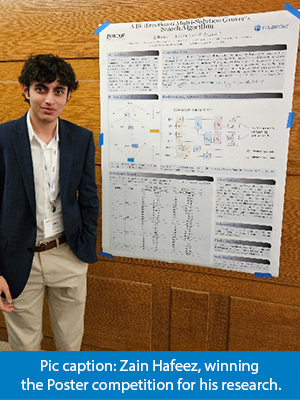InStep: Breaking Barriers ft. Zain Hafeez
July 31, 2025
Spotlight: Zain Hafeez, Infosys InStep Tech Intern from Indianapolis working with iCETS on the Accessibility Living Lab in Indianapolis
Infosys Foundation USA and the InStep Program
The InStep internship program is globally recognized for providing students from top universities with meaningful opportunities to work on real-world projects while contributing to research and innovation.
Given a commitment to inclusion and accessibility, Infosys Foundation USA reached out to InStep to explore partnerships to advance our respective missions. As a result, in partnership with InStep, Infosys Foundation USA works to actively identify, recruit and support interns with disabilities, helping ensure that they have equitable access to opportunities in the workforce. This initiative furthers the Foundation’s commitment to expanding access to computer science and digital literacy for all, especially those who have been historically underrepresented.
In this spotlight, we get to know Zain Hafeez: his love for Quantum computing, his motto of self-sufficiency, and his pursuit of career aspirations.
Meet Zain Hafeez
Q: Tell us a bit about yourself and your academic journey.
 My name is Zain Hafeez, and I’m entering my fourth year at Purdue University, studying Physics
and Mathematics. I’ve spent a good deal of time working on research in quantum computing, with
several papers currently under review and more projects on the way. I also recently won a poster
competition for my research.
My name is Zain Hafeez, and I’m entering my fourth year at Purdue University, studying Physics
and Mathematics. I’ve spent a good deal of time working on research in quantum computing, with
several papers currently under review and more projects on the way. I also recently won a poster
competition for my research.
I was introduced to the Infosys Foundation USA and Infosys InStep internship through a couple of connections, and what I’ve enjoyed the most is the freedom to work on things that truly interest me, especially at the intersection of quantum technology and blockchain.
Q: Where did your interest in physics and computing begin?
Originally, I wanted to be an astronomer. That’s what drew me into physics. My first high school physics class with a great teacher inspired me further. Later, I began to learn quantum computing, which quickly became my focus. I started doing research in it soon after.
Q: What are you currently working on during your internship?
I’m working remotely under Tim Wales (Senior Technology Architect, iCETS), focusing on research involving blockchain structures based on quantum mechanics. I try to align my work with both what’s interesting to me and what’s meaningful for the company (Infosys).
“Zain jumped into four different proof-of-concept projects during his internship, including one of his own design on quantum blockchain. He also contributed to multiple showcase demos for our Accessibility Living Lab and helped contextualize solutions for client presentations. Whether collaborating with teams in Indianapolis, Connecticut, or Arizona, Zain consistently showed initiative, adaptability, and a spirit of teamwork. He made a meaningful impact across the board. I’d highly recommend working with Zain – he’s brilliant.”
-Tim Wales, Senior Technology Architect & Mentor, Infosys Limited
Q: What do you see as the future of quantum information science and AI? What’s your role in it?
AI has already shown what it can do. Quantum computing, though, is still in its early stages. Many university physics departments are investing heavily in quantum information science, and I want to be at the forefront of its development.
So far, most of my work has focused on quantum algorithm development, and I plan to pursue a PhD in Physics before moving into industry research. I’m especially interested in how quantum and AI can converge in the future.
Q: You've mentioned living with severe hearing loss. Can you share how that has shaped your path?
I have severe hearing loss in both ears which has naturally been the biggest barrier; but it’s more or less immutable so there’s not much that can be done to fix that aside from using hearing aids. However, I would say it’s forced me to become a self-sufficient learner which has proven to be an indispensable skill.
Q: What would you tell another young student with a similar challenge?
The most important thing is thinking about how you think and figuring out how you learn best. There’s not too much advice I can give other than that. It’s ultimately a journey of self-discovery.
Q: Did you visit the Infosys Foundation USA-sponsored Accessibility Living Lab at CrossRoads this year? How do you view the role of innovation in accessibility?
Yes, I did visit the Accessibility Living Lab in Indianapolis. While I haven’t come across a specific innovation that replaces or enhances my hearing aids, the spirit of inclusive research is important. It’s work like that, designing with accessibility in mind, that could lead to breakthroughs for people with disabilities across different domains.
Closing Thoughts
Zain Hafeez’s story is a compelling reminder that disability does not diminish potential; but rather elevate it. Through its accessibility-focused collaboration within InStep, Infosys Foundation USA is not just sharing these stories, but helping to shape them by creating pathways for talented individuals like Zain to thrive.
As his mentor, Tim Wales, quipped, “He was just part of the team, and there were no barriers; to the point that nobody even knew he had a disability.”
Zain’s journey reflects what becomes possible when inclusion is not just an intention but is action - creating environments where everyone can contribute fully. That is the inclusive the future Infosys Foundation USA is committed to building for our future workforce.

